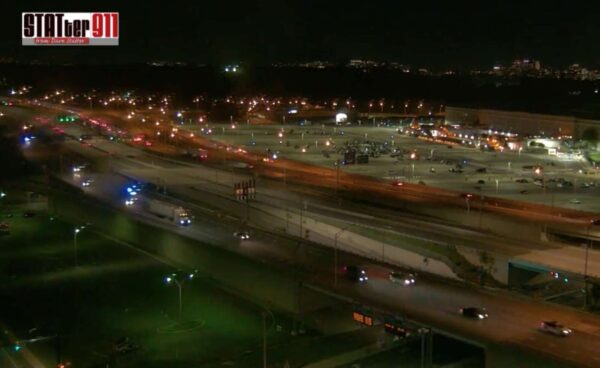
It’s been a common occurrence lately, documented by public safety watchdog Dave Statter: Virginia State Police engage in high-speed chases on I-395 but abandon them at the D.C. line.
That’s because VSP’s loose restrictions for initiating a chase tighten when troopers reach state lines.
“Sworn employees may initiate a pursuit when a driver fails to stop after the sworn employee has given a lawful order to stop by activating emergency lights and/or siren,” according to state police chase policy. But anyone being chased for a possible misdemeanor or traffic violation, who manages to reach D.C., is in the clear.
“Unless the violator’s offense is a felony, sworn employees will discontinue pursuit at the state line,” the policy says. “If the violator is being pursued in connection with a felony offense (in addition to felony eluding police), the pursuit may continue into the District of Columbia or any adjoining state except Kentucky with the approval of a supervisor.”
It almost is a nightly event — @VSPPIO giving a driver a high speed escort into DC via I-395N. This pursuit was at 1 am and, as usual, was cut off at the 14th Street Bridge. @WTOPtraffic @WTOP @ARLnowDOTcom @CordellTraffic #police #traffic #vatraffic #dctraffic #395cam #STATcam pic.twitter.com/UjFFaWbMLh
— Dave Statter (@STATter911) October 15, 2021
Another high speed escort into DC. @VSPPIO chased a stolen vehicle from I-495, north on I-395 and across the 14th Street Bridge. This one was so fast & so far ahead it was hard to follow. @WTOPtraffic @ARLnowDOTcom @CordellTraffic #police #pursuit #traffic #vatraffic #395cam pic.twitter.com/sGULmDpUbz
— Dave Statter (@STATter911) October 20, 2021
Asked about which types of incidents typically lead to troopers calling things off at the 14th Street Bridge, and which lead to chases continuing into the District, VSP spokeswoman Corinne Geller said “there’s no one-size-fits-all answer that I can provide.”
“In accordance with Virginia State Police policy, each pursuit is assessed on a case-by-case basis,” she said. “The trooper and supervisor will assess the pursuit based on the variety of factors that are known and unknown at every stage of the pursuit, which will then determine if/when it is in the best of the interest of the public to terminate a pursuit.”
Sometimes, of course, police are able to stop fleeing drivers before they enter the District. Statter posted video of state police stopping a vehicle and making an arrest with guns drawn on I-395 near the Pentagon this past weekend.
.@VSPPIO with guns drawn on a traffic stop on I-395N across from the Pentagon. No delays, but be careful, only left lane gets by. @WTOPtraffic @ARLnowDOTcom #police #traffic #vatraffic pic.twitter.com/h7hu708aGf
— Dave Statter (@STATter911) October 23, 2021
If VSP chases a suspect in Arlington County, local police can and have helped nab suspects, but Arlington County Police Department policy specifies officers can only give chase when there’s a serious crime involved. While both have jurisdiction on state highways in Arlington, VSP predominantly handles enforcement there, ACPD spokeswoman Ashley Savage says.
Arlington officers can only give chase if there is probable cause that a driver or occupant has committed a violent felony or an offense involving the use or threatened use of a firearm, or has warrants on file for either reason. Additionally, ACPD officers can give chase if the pursuit could “abate a danger of a substantial likelihood of death or serious bodily injury,” the policy reads.
When they reach county lines, officers don’t have to stop, but they should consider their “level of familiarity” with the area, per the policy.
While Arlington police will maintain a lookout for a vehicle that flees from them on traffic or minor charges — searching the area without giving chase — the only other recourse in the moment is to notify state police and other local and federal law enforcement agencies.
As for joining other pursuits, the ACPD policy says “officers shall not join in a pursuit initiated by another jurisdiction that enters Arlington County unless the driver or occupant is wanted for any of the above-listed offenses.”
The history of Arlington’s more restrictive chase policy dates back to a controversial chase in 1979. A local officer chased a suspected bank robber from Arlington through the streets of D.C. at 80 mph and the fleeing suspect struck a bystander, who lost both his legs and received a $5 million settlement.
This week, VSP’s broad policy for giving chase for traffic violations came into question after a chase Sunday morning ended in a deadly crash. Two Fredericksburg men were killed after crashing into a jersey barrier on I-95 as they tried to elude state police. A trooper had tried to pull them over for going 72 mph in a 55 mph zone.
NBC4 reported that according to police dispatch audio, the dispatcher said the getaway car “might be a stolen auto.” VSP said that was incorrect information.
The scanner traffic was not accurate…and was not relevant to the scope of the pursuit. The traffic stop was for speeding – 72 mph in a 55 mph. The Dodge refused to stop & instead sped away at a high rate of speed. A pursuit was initiated.
— VA State Police (@VSPPIO) October 25, 2021
In an NBC4 interview Monday, one of the victim’s mothers questioned the decision to give chase for going 17 mph over the limit.
VSP is reviewing the chase, per its policy, which requires an investigation into “any fatal, personal injury or serious property damage crash that occurs during a pursuit.”
The policy was last revised on April 1 of this year and is next slated for review in July 2022.

